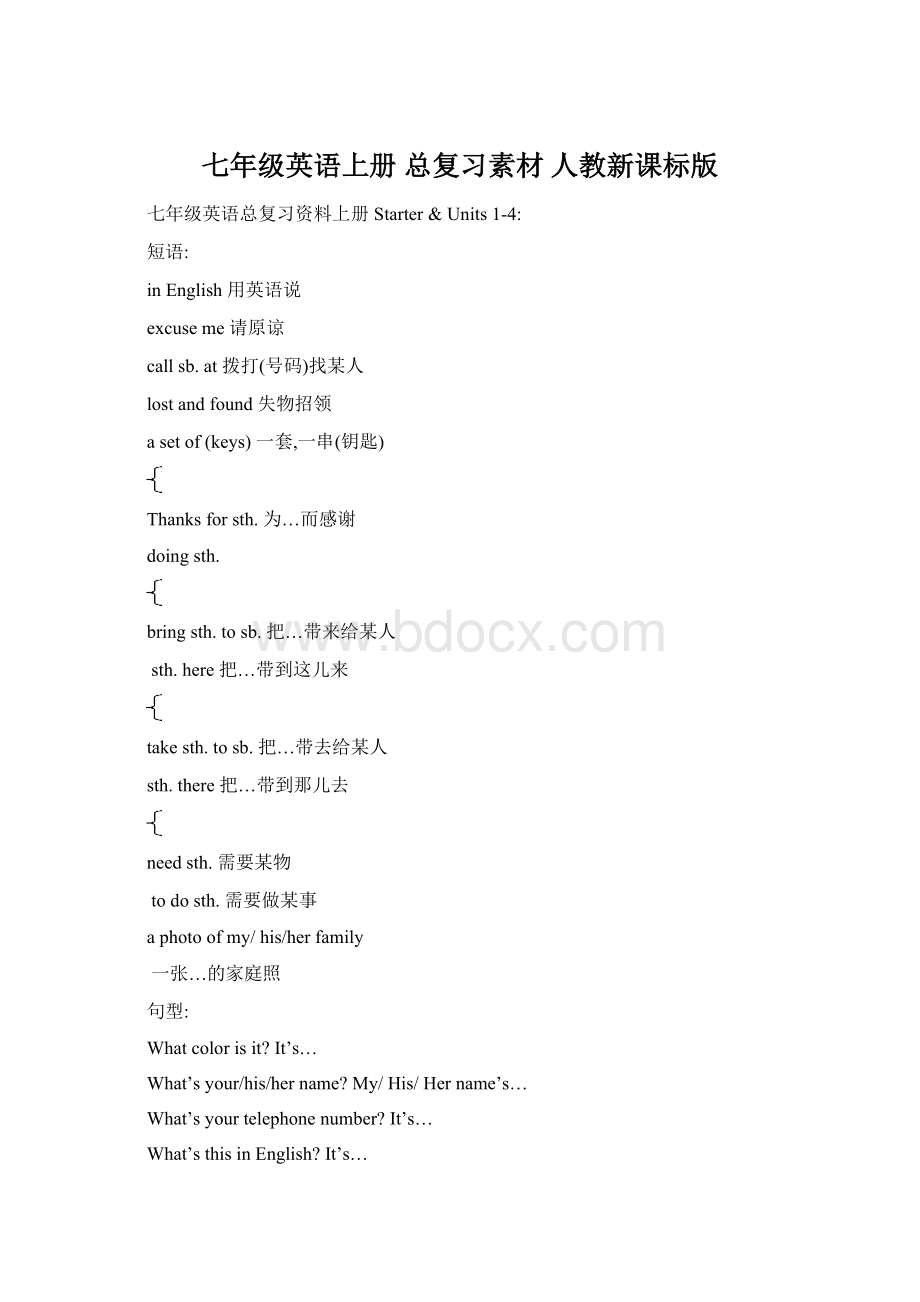七年级英语上册 总复习素材 人教新课标版.docx
《七年级英语上册 总复习素材 人教新课标版.docx》由会员分享,可在线阅读,更多相关《七年级英语上册 总复习素材 人教新课标版.docx(32页珍藏版)》请在冰豆网上搜索。

七年级英语上册总复习素材人教新课标版
七年级英语总复习资料上册Starter&Units1-4:
短语:
inEnglish用英语说
excuseme请原谅
callsb.at拨打(号码)找某人
lostandfound失物招领
asetof(keys)一套,一串(钥匙)
Thanksforsth.为…而感谢
doingsth.
bringsth.tosb.把…带来给某人
sth.here把…带到这儿来
takesth.tosb.把…带去给某人
sth.there把…带到那儿去
needsth.需要某物
todosth.需要做某事
aphotoofmy/his/herfamily
一张…的家庭照
句型:
Whatcolorisit?
It’s…
What’syour/his/hername?
My/His/Hername’s…
What’syourtelephonenumber?
It’s…
What’sthisinEnglish?
It’s…
Spellit,please.K-E-Y.
Howdoyouspellit?
Whereis/are…?
It’s/They’rein/on/under/behind/infrontof/nextto/near…
Units5-6:
短语:
playsoccer/tennis/baseball/ping-pong/basketball/volleyball打…球
watchTV看电视
sth.onTV
havebreakfast/lunch/dinner吃早餐/午餐/晚餐
have/like…forbreakfast/lunch/dinner/dessert吃/喜欢吃…作为早餐/午餐/晚餐/甜点
eatwell吃得好
lotsof大量;许多haveasportscollection收集体育用品
句型:
Doyouhave…?
Yes,Ido./No,Idon’t.
Doeshe/shehave…?
Yes,he/shedoes./No,he/shedoesn’t.
Let’splaysoccer.
Thatsoundsgood/great/interesting.Butit’sdifficult.
Doyoulike…?
Doeshe/shelike…?
Units7-8:
短语:
20th(twentieth)在八月二十/十二号
onAugust
12th(twelfth)
buysth.forsb.给某人买某物
affordtodosth买得起某物
buysth.from…从…买某物
sellsth.to…把某物卖给…
onsale廉价出售
havealook(atsth)看看(某物)
alongwhiteT-shirt一件白色的长T恤衫
atagoodprice价格合理
apairofsocks/shoes/pants/shorts
一双短袜/鞋子;一条长裤/短裤
句型:
isthisjacket?
It’sfortyyuan.
Howmuch
arethesesocks?
They’retwelvedollars.
I’lltakeit/them.
thespeechcontest?
It’s…
Whenis
yourmother’sbirthday?
It’s…
What’syourage?
=Howoldareyou?
Wehavepantsfor30yuan.
Thepantsare30yuan.
Units9-10:
短语:
gotoamovie/gotomovies去看电影
begoodwithsb和某人友好相处
helpsb.with(doing)sth.
helpsb.dosth.帮助某人做某事
want(sb)todosth想要(某人)做某事
onweekend(s)在周末
learnaboutChinesehistory了解中国历史
jointhesportsclub参加运动俱乐部
showsb.sth.把某物拿给某人看
showsth.tosb.
句型:
Doyouwanttogotoamovie?
Yes,Ido.Iwanttoseeacomedy.
Doeshewanttogotoamovie?
Yes,hedoes./No,hedoesn’t.
Whatkindofmoviesdoyoulike?
Ilike….
Whatkindofmoviesdoesshe/helike?
She/Helikes…
Canyouplaytheguitar?
Yes,Ican./No,Ican’t.
CanshespeakEnglish?
Yes,shecan./No,shecan’t.
Whatclubdoyouwanttojoin?
Iwanttojointhebasketballclub.
Units11-12:
短语:
gotoschool去上学
getup起床
eatbreakfast吃早餐
take/haveashower洗澡
brushmy/his/herteeth刷牙
takeabus(to…)乘坐公共汽车(去…)
=goto…bybus
bebusydoingsth.忙于做某事
bebusywithsth.
gethome/there/here到家里
gettoschool到学校
gotobed上床睡觉
domyhomework做作业
knowabout了解
bestwishes致以最美好的祝愿
havemath上数学
bestrictwithsb.对某人严格
allnight整晚
listento听…
playwith跟…一起玩
runaround到处跑
halfanhour半小时
writetosb.写信给某人
inthemorning/afternoon/evening在早上/…
句型:
Whattime/Whendoyouusuallygetup?
Iusuallygetupatsixo’clock.
Whattimeisit?
=What’sthetime?
It’seightthirty.
What’syourfavouritesubject?
Myfaouritesubjectisscience.
Whydoyoulikescience?
Becauseit’sinteresting.
Whoisyourscienceteacher?
MyscienceteacherisMrWang.
Whendoyouhavemath?
I/WehavemathonMonday.
下册
Unit1Where’syourpenpalfrom?
一、词组
befrom=comeform来自...penpal=penfriend笔友
likeanddislike好恶;爱憎livein+地点在...居住
speak+语言讲某种语言playsports做体育运动
alittleFrench一些法语gotothemovies去看电影
writetosb给某人写信anactionmovie一部动作片
onweekends在周末tellsbaboutsth告诉某人某事
Excuseme对不起,打扰getto到达、抵达
二、句型
1、Where+be+主语+from?
主语+be+from+地点.
2、Wheredo/does+主语+live?
主语+live/livesin…
3、Whatlanguagedo/does+主语+speak?
主语+speak/speaks….
4、主语+like/likes+doing/todo…
5Whatisyourfavoritesubject/sport?
Myfavoritesubject/sportis…
6.It’sfun.
7.Isthatyournewpenpal?
Yes,itis.
国家与语言(熟悉内容):
China – Chinese (汉语,中国人)
England – English
Canada – Canadian (加拿大人)
France – French (法语,法国人)
America – American (美国人)
Japan – Japanese (日语,日本人)
Australia – Australian (澳大利亚人)
(p1)befrom=comefrom来自:
LindaisfromJapan.=LindacomesfromJapan.
那么Where'syourpenpalfrom?
=?
(p2)live住,居住(后跟地点是常用livein)。
例如:
IliveinChina.
DoyouliveinChina?
Yes,I do.No,I don't.Idon'tliveinChina.
Wheredoyoulive?
HisauntlivesinSydney.DoeshisauntliveinSydney?
Yes,shedoes.
No,shedoesn't.Hisaunt doesn'tliveinSydney.WheredoesHisauntlive?
(p3)说某种语言用speak,speak Chinese/English /Japanese / French 说汉语/英语/日语/法语
问某人说某种语言用句型Whatlanguagedo/doessbspeak?
Whatlanguagedoyouspeak?
Ispeak Chinese.
WhatlanguagedoesMaryspeak?
ShespeaksEnglish .
(p5,3a)14yearsold14岁解释:
数字+year(s)old…岁当数字大于1时,year用复数years。
Iam30yearsold.Hersonis1yearold.
(p5,3a)can为情态动词,“能,能够,会”。
后面跟动词时必须用动词原形。
肯定句变成一般疑问句需把can提到句首。
肯定句变成否定句只需把can变成can't既可。
例如:
ShecanspeakEnglish.CanshespeakEnglish?
Yes,shecan.No,shecan't.
Shecan'tspeakEnglish.
(p5,3a)“Like+动词ing”表示“喜欢做某事”Ilikeplayingbasketball.Tomlikeslisteningtomusic.
注意:
“Like+to+动词”也表示“喜欢做某事”,只是“Like+动词ing”表示习惯性动作(也可以说是爱好),而“Like+to+动词”表示一次性或短暂性的。
Our PE teacher likes swimming.(表示爱好)Helikesplayingbasketball,buttodayhedoesn'tliketoplaybasketball.他爱好打篮球(爱好),但是今天他没去打篮球(短暂性的)。
(p5,3a)Writeto人:
写信给某人HeoftenWritestohismother. DoyouoftenWritetoyourpenpal?
(p5,3b)onweekens在周末
(p5,3b)favorite形容词“最喜爱的”,名词“最喜爱的人或物”Myfavoritesportissoccer.我最喜爱的运动是足球。
Hammbugersare my favorite.是我最喜爱的食物。
(p5,3b)tell sb.aboutsth告诉某人某事
Mymother often tells me about my grandfather.我的妈妈经常告诉我关于我爷爷的事。
Unit2Where’sthepostoffice?
一、词组
postoffice邮局payphone投币式公用电话nextto在...隔壁acrossfrom在...对面
infrontof在...前面between…and… 在...和...之间onastreet在街上
intheneighborhood在附近ontheright/left在右边/在左边behind…在…后面
onGreenstreet在格林街上near…在…附近gostraight一直走welcometo…欢迎
enjoy+名词/doing喜欢做某事havefun过得愉快play+the+乐器弹奏乐器
onone’sright/left 在某人的右边/左边turnright/left向右/左转takeawalk散步
havefun玩得开心thewayto…去...的路letsbdosth让某人做某事takeataxi打的/乘出租车godown(along)…沿着...走gothrough...穿过..haveagoodtrip旅途愉快arriveat(小地方)/in(大地方)到达atthebeginningof在...开始的时候attheendof在...结束的时候hopetodosth/that/forsth
二、日常交际用语。
1、Isthereabanknearhere?
Yes,thereis.It’sonCentreStreet./No,thereisn’t.
2、Where’sthesupermarket?
It’snexttothelibrary.
3、BridgeStreetisagoodplacetohavefun.
4、Ihopeyouhaveagoodtrip.
5.Ifyouarehungry,youcanbuyfoodintherestaurant.
6、Talkawalkthoughthepark..
7.IknowyouarearrivingnextSunday.我知道你下周日要来。
三、句型。
1、Istherea….?
句型Eg:
-Excuseme.Isthereahotelintheneighborhood.-Yes,thereis.No.thereisn’t
2、Whereis…?
句型Eg:
-Whereisthepark,please?
-It’sbehindthebank.(肯定回答)-I’msorryIdon’tknow.(否定回答)
3、Whichisthewayto+地点?
句型.例如:
-Whichisthewaytothelibrary.
4、HowcanIgetto+地点?
句型.例如:
-HowcanIgettotherestaurant?
5、Canyoutellmethewayto+地点?
句型.例-Canyoutellmethewaytothepostoffice?
6、Letmetellyouthewaytomyhouse.7、Justgostraightandturnleft.
(p7-8)“Therebe结构的一般现在时基本句型如下:
肯定句:
①Thereis(There's)abigsupermarketnearmyhome.
(可数名词单数)在我家附近有一个大超市。
②Thereis(There's)somewaterintheglass.(不可数名词)在玻璃杯里有一些水。
③Thereare30studentsintheclassroom.(可数名词复数)在教室里有30个学生。
否定句Therebe结构的否定句只需在肯定句中be的后面加not即可。
(isnot=isn't,arenot=aren't)。
因此以上三句的否定句依次为:
①Thereisn'tabigsupermarketnearmyhome.名词单在我家附近没有大超市。
②Thereisn'tanywaterintheglass.在玻璃杯里没有水。
(肯定句中的some,在疑问句和否定句中需要变成any)③Therearen't30studentsintheclassroom.在教室里没有30个学生。
疑问式和简略答语
一般疑问句:
只需把肯定句中的be提到句首即可。
因此以上三句的一般疑问句依次为:
①Isthereabigsupermarketnearyourhome?
Yes,thereis.No,thereisn't.在我家附近有一个大超市吗?
②Isthereanywaterintheglass?
Yes,thereis.No,thereisn't.在玻璃杯里有一些水吗?
③Arethere30studentsintheclassroom?
在教室里有30名学生吗?
Yes,thereare.No,therearen't.
特殊疑问句:
Howmanydaysarethereinaweek?
一个星期有多少天?
Thereareseven.有七天。
注:
在Therebe结构的一般现在时基本句型中,若“某物/某人”为好几个并列,往往根据第一个人/物的单复数来确定be的形式。
比较以下两句的差异:
Thereisapenandtwobooksonthedesk.
Therearetwobooksandapenonthedesk.
(p8)方位词的用法:
①nextto在…旁边,②between…and…在…和…之间③acrossfrom在…对面,④behind在…的后面,⑤intheneighborhood在附近,⑥inthefrontof在(物体里面的)前面,infrontof在(物体外面的)前面,⑦on在…街上
①Thelibraryisnexttothebank.②Thelibraryisbetweentherestaurantandthebank.
③Thebankisacrossfromtherestaurant.④Theparkisbehindthebank.
⑤Thereisapayphoneintheneighborhood.⑥Thereisablackboardinthefrontofclassroom.在教室的前面有一块黑板。
(黑板在教室的里面)Thereisabigtreeinfrontofclassroom.在教室的前面有一棵大树。
(大树在教室的外面)⑦ThelibraryisonYiMengStreet.
(p9)gostraight一着往前走,turnleft/right向左/右拐,ontheleft/right在左边/右边
(p10,1a)形容词反意词:
clean—dirty;new—old;big—small
(p11,3a)thegardendistrict花园小区;takeawalk散步;
thebeginningof…的开始Doyoulikethebeginningofthemovie?
你喜欢这步电影的开头吗?
(p11,3a)enjoy喜欢,过得快乐(后面跟的动词必须加ing)Ienjoythemovie我喜欢这步电影。
SheenjoyswatchingTV.她喜欢看电视。
(p11,3b)havefun玩得快乐;playtheguitar弹吉他(play后跟乐器时必须加the,但后跟球类时不加the,例如:
playbasketball)
课文解释:
①(p11,3)IknowyouarearrivingnextSunday.解释:
“be+动词ing”为现在进行时,在这句中nextSunday“下个星期天”为将来时间。
you arearrivingnextSunday.是现在进行时表示将来动作的用法,这种情况多用于go,come,leave,arrive等表示动作来去的动词,例如:
Heisleavingtomorrow.明天他将离开。
②letsbdosth让某人做某事(letus=let's)let'splaybasketball.
③thewayto+地点:
去某地的路thewaytoschool去上学的路上;thewayhome回家的路上(在这里home之前无修饰成分,为副词,去掉to)
④takeataxi乘出租车;haveagoodtrip旅途愉快
Unit3Whydoyoulikekoalas?
一、词组
wanttodosth.想要做某事wantsbtodosth想要某人做某事wantsth想要某物
Letsbdosth让某人做某事kindof有几分\种类akindof一种…
…yearsold…年龄 liketodosth喜欢做某事likedoingsth
playwith… 与...一起玩duringtheday在白天atnight在夜间
havealookat..看...one…theother一个...另一个...
二、句型与日常交际用语。